
views
Using Vellum in Scrapbooking

Place vellum over photos to create unique effects. Vellum is translucent, so it can be placed over photos without hiding them. This can create a variety of effects in a photo. Vellum can give photos a blurred look, which may help establish the theme you're going for on a scrapbook page. A darker colored, hazy vellum can provide a dreamy look to a page. A wedding photo can be made more romantic with hazy vellum covering it. If you include photos from wintertime or Christmas, try placing a white or ivory piece of vellum over the photos. This will give them a wintery feel. You can also cover up a portion of a photo with vellum. This can emphasize certain features of the photo, while blurring others. Maybe you have a picture of your toddler laughing, and want to emphasize her smile. You can create a border with vellum going around your toddler's face. This will make viewers focus on her smile.
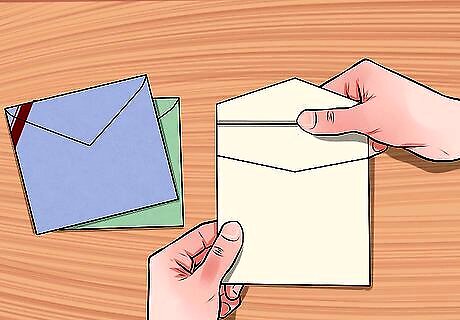
Create pockets using vellum. As vellum is see through, you can make a pocket with vellum that will not conceal items in your scrapbook. If there's an item you want to showcase in your scrapbook, but do not want to tape or glue down this item, try displaying it with a vellum pocket. Cut out a square or rectangle of vellum big enough to pocket your chosen supplies. Place the vellum onto your chosen page. Use a sewing machine to stitch around the edges of your vellum pocket. Do not stitch the top edge of the vellum. This is the opening of your pocket. Slide your materials through the top edge of the vellum. You can now display materials that are meant to be removed and examined more closely when someone pages through your scrapbook.
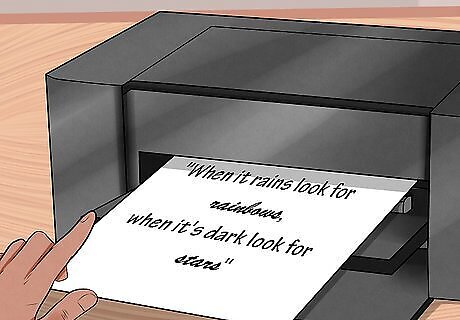
Print quotes onto vellum. Vellum with quotes can be used as a background piece for a series of photos. You can also print quotes on vellum and lay the pieces over a photo. This way, you can have inspiration quotes superimposed over images in your scrapbook. You can go to a local print shop to print on vellum. Choose quotes relevant to what you're trying to convey on your scrapbook page. For example, say you're scrapbooking your wedding photos. It may be a fun idea to write out the lyrics to the song you danced to for your first dance.
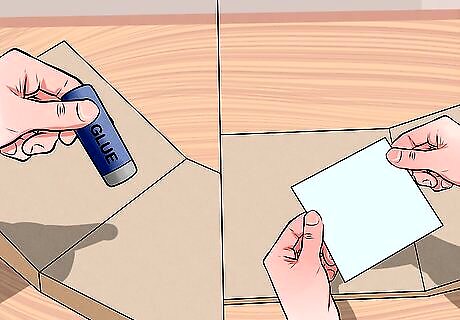
Use the proper adhesive when attaching vellum to your scrapbook. When you attach vellum to the pages of your scrapbook, use an adhesive that will keep vellum on longterm. Glue sticks and glue sprays are generally the most effective to use on vellum. You can get these products at a local craft store. When gluing down vellum, place the glue on the page rather than the vellum. Adhesive can show up beneath vellum, as vellum is transparent. Therefore, it's a good idea to place adhesives in portions of vellum that will be covered by extra layers or decorations.
Using Vellum for Art and Design

Draw and illustrate on vellum. Vellum is an excellent surface for drawing and illustration. If you draw and illustrate as a hobby, try doing some drawings on vellum. This can give your pictures a unique look, and vellum can provide a sturdy surface for drawings. Typically, ink drawings are done on vellum. Preliminary drawings can also be done on vellum. That is, if you want to draw or paint something on a canvas, you can practice on vellum paper first. If you want to add color, vellum's surface works well with colored pencils. Colored pencils will blend more easily, creating a smooth texture.
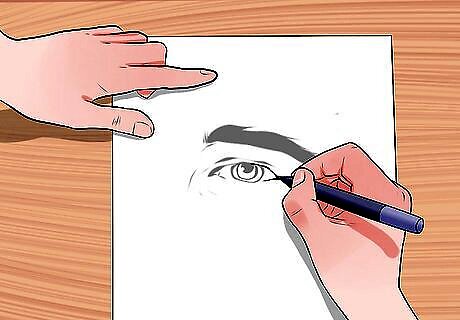
Trace your favorite designs. As vellum is translucent, it is perfect for tracing existing designs or replicating a drawing that you are particularly proud of. Lay the vellum over the design and use ink or pencil to recreate the image. When tracing on vellum, you will be drawing on what is known as the "hair side." This is the side of vellum that is hard and smooth. The "skin side" is softer and fuzzier, and should not be drawn on. Test different types of pencils on a vellum surface. You want to find a pencil that works with your chosen vellum. You want the trace marks to be thin and smooth, and you do not want lead piling up on the vellum and clogging the pores. Use tissue paper to cover areas you are not drawing on. Lead may smear during the tracing process, so tissue can help keep the lead contained.
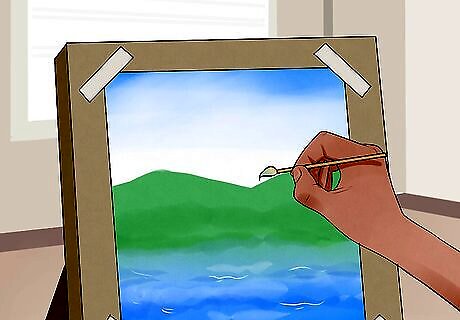
Paint on vellum. Vellum may be used with certain painting mediums. Vellum can make a painting's colors appear shinier, and many people enjoy painting on vellum. Apply a neutral base color to the vellum before you begin painting. When dipping your brush in paint, you want to have enough to coat the vellum evenly, but not so much that you're leaving blobs of paint on the vellum. It may take a few brush strokes before you find the right amount of paint to add to your brush. Once your base coat is dry, you can begin painting you images on vellum. With vellum, you paint in layers. You add one layer of color, wait for it to dry, and then add another. Move from light colors to dark colors, and move your brush slowly over the vellum to prevent smearing and paint blobs. Use the type of brush your painting requires. To create thin lines, for example, you would need to use a thinner brush. You may have to switch between various brush types as you create your painting.
Using Vellum for Simple Crafts

Print on vellum. Printing on vellum can be used for a variety of small crafts. You can, for example, print a nice quote on attractive vellum paper, and then put in a picture frame as a gift. You can also print out a birthday greeting on vellum, and glue the vellum inside a card. Printing on vellum can be somewhat tricky, so have patience during the printing process. Read your printer's manual and see if there are any specific instructions for printing on unconventional types of paper. Ink can smear easily on vellum, so see if your printer has a "draft" or "quick" printing mode. These modes tend to use less ink. See if your printer lets you choose a paper type when printing. Most printers default to "plain paper." Instead, select something like "photo paper" or "fine art paper." After printing your vellum, set it aside to dry. Ink will take awhile to dry on a vellum surface, so it's important to set the paper aside to dry. Do not attempt to use vellum in crafts until the ink is dry to the touch.
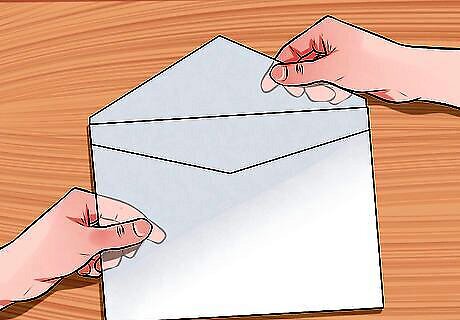
Make an envelope with vellum. Take apart a regular envelope and use it as a template to create the vellum envelope. When assembling the envelope, try using glue specifically made for vellum, as vellum possesses different adhering properties than typical paper. Make sure to use a glue that dries clear. Standard or colored glues will be visible through the translucent nature of vellum. As vellum can be hard to write on, and can smear easily, you may want to mail out vellum envelopes inside conventional envelopes.
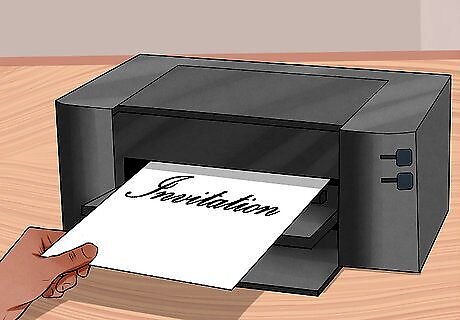
Print a greeting card. Print your wedding invitations or other greeting cards on vellum for an airy design. These can be further modified with a drawing or personalized message once the printing has completed. If you're having trouble feeding thick cardstock into the printer, consider printing onto the vellum and overlaying it onto the cardstock instead. Attach the vellum with vellum glue along the top, or punch holes through the vellum and cardstock and use a ribbon to tie them together.
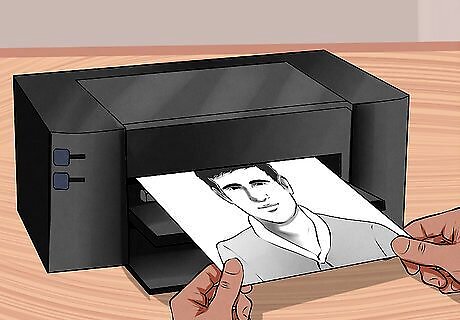
Print out photos on vellum. Mat a photo onto a larger sheet of plain, colored or printed vellum. You can then lay the printed photo on colored cardstock. Create a border by choosing a sheet of cardstock larger than the vellum or with an overmat. Add a mounting board, glass and a frame if you wish. The photos can also be printed on vellum paper directly and combined with standard cardstock for various effects.

















Comments
0 comment